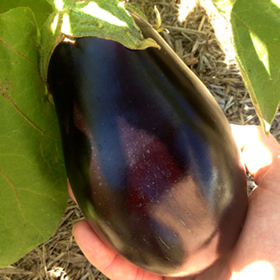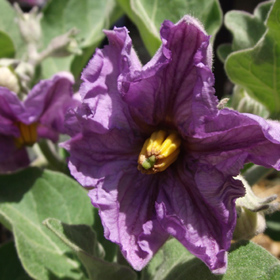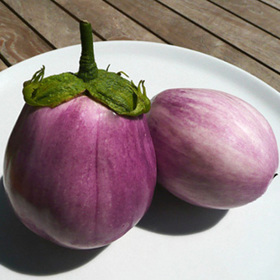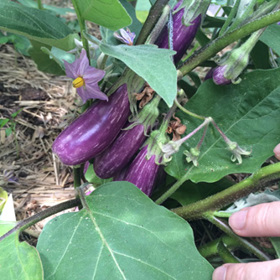Eggplants
BackEggplant, or aubergine, is a versatile plant that is used in cooking in many countries all around the world. It’s the basis of classic recipes such as moussaka and baba ghanoush plus eggplants can also be used in lasagne and are good for stuffing.
Eggplants produce greyish furry foliage and mauve flowers and come in quite a variety of different fruit colours and sizes including:
- ‘Black Beauty’ – the classic eggplant fruit which is large with dark glossy purple skin
- ‘Little Finger’ – produces clusters of small, elongated fruit and are great for growing in pots.
- ‘Rosa Bianca’ – a rather fat rounded fruit with white and soft mauve skin.
- ‘Turkish Orange’ – an heirloom variety from Turkey with orange coloured eggplants with green stripes. Produces 15-25 fruits per plant and is excellent for stuffing.
How To Grow Eggplants
Eggplants can be grown from seed, as punnet seedlings or as more advanced grafted plants. Growing from seed is definitely worth exploring as a great way to try heirloom varieties not commonly sold as plants in stores. It’s also a clever way to get a head start on the season!
Plant seeds in a good quality potting mix, water in with OCP eco-seaweed and then keep them moist but not wet. Eggplant seeds need warm soil for good germination so place punnets on a heating tray or in a warm spot to speed things up eg a sunny window sill or the top of a water heater. When planting out seedlings ensure any frosts are long gone.
Choose a full sun position with good drainage and add plenty of organic compost and aged manure to the soil. Apply dolomite to ensure there will be enough calcium available to the plants for fruit development. If your soil is already the correct pH then use gypsum to boost calcium as it won’t alter the pH.
Alternatively smaller eggplant varieties will happily grow in pots or containers filled with quality potting mix.
Taller varieties can benefit from staking as the fruit can be quite heavy as it matures and plants may topple over especially in windy locations. Strong and sturdy tomato stakes are best and should go in at the same time you plant to minimise any root damage.
NOTE: To prevent the spread of diseases, it is important to not plant eggplants in the same soil where their close relatives have previously grown. This includes potatoes, tomatoes, chillis and capsicums. Rotate your crops with a break of at least 2-3 years between similar plantings.
Sowing Guide for Eggplants
| Growing Zone | Sowing Time |
| Cool Zones | Spring |
| Mediterranean Zones | Spring, Summer |
| Warm & Temperate Frost Free Zones | Spring, Summer, Autumn (early) |
| Tropical & Subtropical Zones | All year round |
Fertilising Eggplants
Eggplants are hungry plants so to really keep your eggplants growing strong apply fortnightly applications of OCP eco-seaweed and OCP eco-aminogro. You will be amazed at the flowers and fruit produced plus plants will be more resistant to disease attack and other stress factors.
Half way through the growing season boost calcium levels again with a further application of dolomite or gypsum. In poor quality soils you can add some more manure, compost or a certified organic pelletised fertiliser as well.
Harvesting Eggplants
Eggplants take a long time to mature usually to 12-14 weeks. Don’t leave fruit too long on the plants once mature as some varieties can turn bitter as they age and develop hard seeds. Choose firm and glossy fruit and remove with a sharp knife or secateurs by cutting through the stem leaving a small stalk on the fruit.
Pests and Diseases of Eggplants
- Whitefly are a common problem but are easily treated with OCP eco-oil. Be sure to spray at the first sign of pests to keep numbers under control. If left unchecked numbers can explode and cause severe damage.
- Aphids and mites can also attack and should be controlled with sprays of horticultural oil. Again act quickly to prevent their numbers getting out of control especially mites.
- Caterpillars can attack the foliage and sometimes the fruit. Check our organic caterpillar guide to tackle these pesky critters.
- Fruit fly can sting developing fruit so hang the OCP eco-lure trap early to monitor for the presence of this pest. When the eco-lure starts catching male flies apply the eco-naturalure bait spray to fully protect fruit.
- Root nematodes are tiny worm-like creatures which distort and damage roots. They stunt plant growth, reduce yields and are very difficult to control once a plant is infested. Focus on prevention by improving the organic content of the soil and practicing crop rotation to prevent nematode numbers building up. Alternatively grow in pots with clean potting mix.
- Blossom end rot causes the eggplant fruit to rot at the base before it is has the chance to fully ripen. This is due to a lack of calcium and/or infrequent watering during hot weather. Water plants deeply and regularly and apply either dolomite or gypsum as previously recommended above. Both will boost calcium levels in the soil.
- Flower drop can be caused by a few different things such as too much water, not enough water, not enough light or pests such as thrips.
- There are various other diseases (fungal, bacterial and viral) which can attack eggplants. Depending on the disease in question plants will show distorted growth or just poor growth in general. Plants can also wither and die suddenly on hot days. Infected plants are impossible or virtually impossible to save and should be destroyed to minimise further spread. Be proactive and protect plants again sap sucking pests (as previously mentioned) which can spread viruses and practice crop rotation to avoid a build up of pathogens in the soil.






